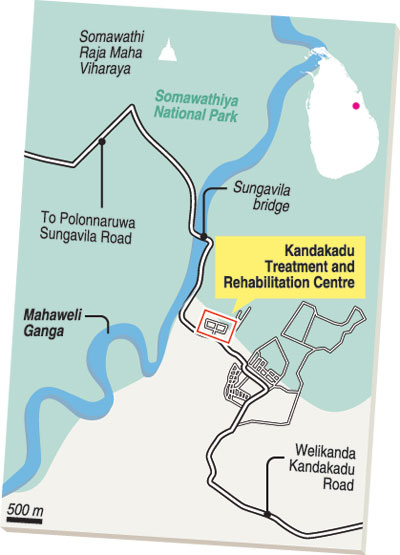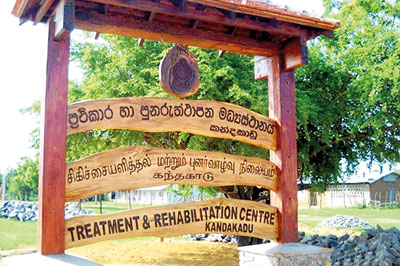News
Military therapy not deemed right for drug addicts
View(s):By Chrishanthi Christopher
Last week’s riots at the Treatment and Rehabilitation Centre for drug dependent prisoners at Kandakadu, during which more than 500 inmates escaped, has pushed the government to move amendments to the Poisons, Opium and Dangerous Drugs Act quickly.
Last Thursday, Justice Minister, Wijeyadasa Rajapakshe presented the amendment to the Act which includes several provisions that would reduce congestion in prisons and also empower law enforcement to act on those using psychotherapeutics not listed under the Act. 
The amendment includes increasing the quantity of heroin possession by a person from two grams to five grams to be sentenced to life imprisonment or death by hanging. Also, those arrested for possessing less than ten grams of heroin could obtain bail from the High Court. Plans are also afoot to send drug offenders under 18 years for rehabilitation instead of prisons.
Also, over 100 drugs have been added to the dangerous drugs list, including methamphetamine, commonly known as ‘ice’, widely used by drug dependent people.
While these steps are expected to ease congestion in prisons, questions are being raised as to how best to deal with those already addicted and are being treated in the state run Kandakadu and Senapura rehabilitation centres.
Human right activists and other stakeholders said the Kandakadu riots, the second in three months, proves that methods used are flawed and need to be revisited.
Major General Dharshana Hettiarachi of the Kandakadu Treatment and Rehabilitation Centre said it is difficult to manage the inmates as several of them are hard drug users and are turning aggressive and violent too often.
He said that the drug situation in the country has worsened and hard core drug dependent people somehow find the drugs they want.
“We need a solid mechanism to combat and prevent the drug menace,’’ he said.
Moreover, the rehabilitation programme in the camp has failed as those accused of rape, murder, and theft are being sent for rehabilitation by court order. It is difficult to discipline them.
Some prisoners who are being rehabilitated go back to prisons as they have been convicted for other offences and have to serve additional prison sentences.
“They go back to the prison environment and to their old ways,’’ he said.
“Another group enjoys staying in the camp, treating it as their second home. They come, stay here and get back to society and their old ways. Some counting up to four times in a row.’’
The follow up is also weakened as many put up a facade during the camp officer’s visit and then go back to their old ways.
The centre has 13 officers who are in various districts to carry out follow ups.
Maj Gen Hettiarachi said that he had asked the judicial commissioner to refrain from sending repeat offenders and those who have multiple convictions.

Kandakadu: Two clashes within 3 months
“There should be a commitment to change, if not, the whole process is a waste,’’ he said.
Meanwhile, a report by the Human Rights Commission Sri Lanka on prisons in 2020, said the decision to treat drug dependents was taken by the judiciary in an ad-hoc manner.
Also the “paucity’’ of medical staff to treat offenders hindered the success of court orders for rehabilitation.
The overcrowded centres are poorly managed with no in-house doctors. Visiting doctors say they have no standard framework to determine drug dependency of a user to decide on appropriate treatment plans.
Moreover, skills development is limited with prisoners not assessed on their personal skills, including former professions and individual preferences, but assigned low skilled programmes making them unsuitable to rejoin society.
Ambika Satkunanathan, a human rights lawyer and an activist, said militarisation of rehabilitation centres is the cause of the riot incidents.
She said the military had no mandate for rehabilitation.
“Who is running the place and who are they taking orders from? she questioned.
Successive governments have taken the problem as a law and order issue and taken punitive measures. “It is a human rights issue.’’
She said scientific and evidence-based treatment therapy should be used instead of archaic methods involving extreme physical labour and punitive punishment with no medical interventions.
Some of the punitive measures include beating, being tied to a tree for long periods, denial of food, strenuous physical exercises, collective punishment and other humiliating chores.
Also, the problem should be approached “multi-dimensionally,’’ she observed.
“Drugs cannot enter the country without the complicity and involvement of people in power including law enforcement.’’ She said that only low-level operatives are arrested.
Melmedura, a non governmental organisation, which carries out a drug demand reduction programme, said despite reports of seizures, drugs are abundant.
“What is happening to substances that are detected? Nobody knows,’’ director Mr Jomo Uduman said.
Mr Rajapakshe when presenting the bill in parliament acknowledged that the drugs seized flow back into the market and blamed corrupt officials.
He suggested photographic evidence be gathered instead of leaving the haul under police or judicial custody. Then, the drugs can be destroyed in the presence of relevant parties.
Referring to methods about counselling substance dependent people, Mr Uduman stressed the use of evidence-based therapy.
He said inmates need constant counselling and guidance during their stay and then regular follow ups at least for two years once they have rejoined society.
“If no followup is done, they can quickly go back to their old ways,’’ he said.
“At Melmedura, we provide them lots of listening, empathy and guidance. Maintaining recovery is tricky.’’
Mr. Uduman suggested that there is a need to share expertise, which calls for coordination among rehabilitation centres run by government and private parties.
“We are ready to share our knowledge.’’
The best way to say that you found the home of your dreams is by finding it on Hitad.lk. We have listings for apartments for sale or rent in Sri Lanka, no matter what locale you're looking for! Whether you live in Colombo, Galle, Kandy, Matara, Jaffna and more - we've got them all!

